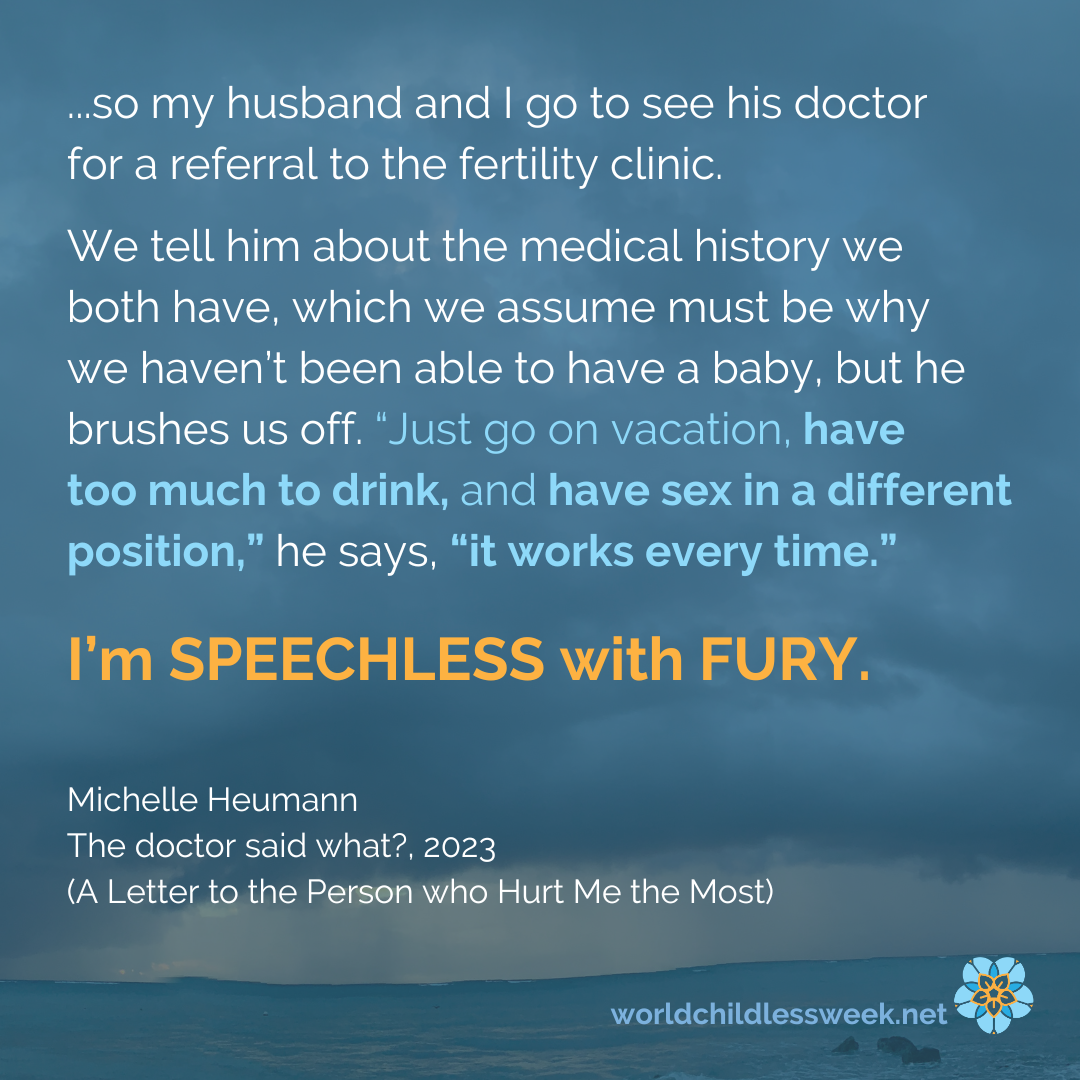Michelle Heumann
My great family doctor is on a year-long sabbatical when we conclude that trying to conceive a baby on our own isn’t working and we need medical help, so my husband and I go to see his doctor for a referral to the fertility clinic.
We tell him about the medical history we both have, which we assume must be why we haven’t been able to have a baby, but he brushes us off. “Just go on vacation, have too much to drink, and have sex in a different position,” he says, “it works every time.”
I’m speechless with fury.
When my doctor gets back, she refers us to the fertility clinic immediately and their wait list is only a couple of months long - but now we’re a whole year closer to turning 40.
And of course none of us know it at the time, but a global pandemic is on the horizon, which will slow the already-overloaded medical system to a crawl.
By the time we go for all the tests, have a diagnosis, and I actually have a surgical consult, far too much time has passed.
The surgeon looks at all my test results and tells me that there is no way I could possibly ever get pregnant without surgery.
I wish I’d thought to ask the surgeon to send a report saying that to my husband’s family doctor!
Eventually, after a long wait, even though the surgery does go quite well, what with us both having had health issues there’s still no way we’ll be able to have a baby without medical intervention.
We prioritize this fight over almost everything else, tracking cycles, spending money, going for tests, taking time away from work and other commitments. The medications make me sick - some days I only have crackers and ginger ale because the nausea is so bad. The first time my husband gives me an injection is a terrible memory. It’s a good thing he’d had experience giving injections to our elderly cat, because I’m far too squeamish to deal with it.
The whole process has other side effects that I don’t want to post about on the internet - but I’m thankful that our marriage was strong enough to withstand them all.
I try to focus on the goal instead of the journey - I dream of the joy that will come when the timing fits together and we finally get a positive test result, when we finally get to post a cute baby announcement on Facebook, when we get to bring our baby to church for the first time.
But we reach the point where all the medical interventions we’re willing and able to pursue fail us, and we never get that joy.
Our doctor at the fertility clinic has no idea why the process hasn’t worked for us - a process that has been extremely stressful, painful, and expensive. The toll it’s taken on my emotional health is profound.
When I leave the fertility clinic after what I know will be the final procedure, whether it’s worked or not, I’m weeping. I’m feeling a dizzying mix of emotions, including, surprisingly, relief that either way this part of the journey is over and I never have to go through that pain again.
When I realize the final procedure has indeed failed, I’m so numb from the rollercoaster of emotions over the last few years that I’m not as devastated as I’d thought I might be - I’m exhausted beyond words.
We go on vacation to an all-inclusive resort in Mexico to celebrate our twentieth wedding anniversary, and part of me wonders if maybe that obnoxious doctor had been right - but of course, he had been extremely wrong.
I will always wonder, if he had referred us to the fertility clinic right away, if we’d been in the system before covid hit, if we hadn’t lost years to the process and had been even just a bit younger when we started the procedures…would that have made the difference?
Obviously we can never know the answers to the what-ifs, but it haunts me, the memory of that smug doctor laughing in his shiny glass office, thinking he was so funny and smart - the sheer arrogance of his so-called advice.
I would like to say to that doctor, and to any other doctor who thinks the way he did: look at the statistics, at the rising number of people who struggle with infertility, and be a little quicker to be helpful and empathetic, and a little slower to make jokes and offer unprofessional, impractical advice, because we’re not the only couple who’s going to come to you for help, and it’s your job to offer sound, well-educated, helpful medical advice, which you didn’t.
My husband has a new family doctor now, but there’s no way to get that lost time back, and there’s no hope for all those lost dreams.

